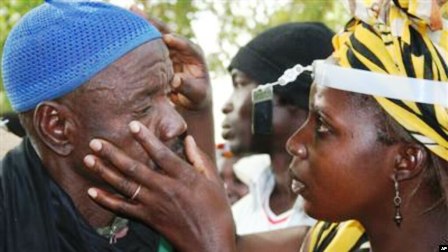The World Health Organisation (WHO) has validated Benin and Mali as having eliminated trachoma as a public health problem, making them the fifth and sixth countries in WHO’s African Region to achieve this significant milestone.
Countries that previously received WHO validation for trachoma elimination are Ghana (June 2018), Gambia (April 2021), Togo (May 2022) and Malawi (September 2022).
“WHO congratulates the health authorities of Benin and Mali and their network of global and local partners for these milestones”, said Dr Tedros Adhanom Ghebreyesus, WHO Director-General. “Following Benin’s and Mali’s success, trachoma remains endemic in 23 countries in WHO’s African Region, bringing us a step closer towards the elimination target for trachoma set in the road map for neglected tropical diseases 2021–2030.”
Globally, Benin and Mali join 15 other countries that have been validated by WHO for having eliminated trachoma as a public health problem. These are Cambodia, China, the Gambia, Ghana, Islamic Republic of Iran, Lao People’s Democratic Republic, Malawi, Mexico, Morocco, Myanmar, Nepal, Oman, Saudi Arabia, Togo and Vanuatu.
Both Benin and Mali implemented the WHO-recommended SAFE strategy to eliminate trachoma with the support of WHO and partners. The SAFE strategy consists of surgery to treat late trachoma complications; antibiotics to clear infection; facial cleanliness; and environmental improvement, particularly improving access to water and sanitation, to reduce transmission. Through the International Trachoma Initiative, the antibiotic azithromycin is donated by Pfizer to elimination programmes implementing the SAFE strategy.
Benin has integrated trachoma elimination interventions with those implemented against other neglected tropical diseases (NTDs), under the umbrella of the National Programme for Communicable Diseases. Trachoma is the third NTD to be eliminated in Benin, after dracunculiasis (in 2009) and gambiense human African trypanosomiasis (in 2021).
Mali has conducted trachoma impact and surveillance surveys and rolled out interventions to achieve elimination targets, despite security challenges in the northern regions of the country and sociopolitical upheavals in recent years. Trachoma is the first NTD to be eliminated in Mali, which therefore now joins a global group of 47 countries that have eliminated at least one NTD.
“These are impressive public health achievements,” said Dr Ibrahima Socé Fall, Director of the WHO Global NTD Programme. “Benin and Mali demonstrate how strong political will, cross-sector integration, surveillance and community engagement can work in concert to achieve disease elimination.”
Significant progress has been made in the fight against trachoma over the past few years. The number of people requiring antibiotic treatment for trachoma in the WHO African Region fell by 84 million, from 189 million in 2014 to 105 million as of June 2022.
About Trachoma
Trachoma remains a public health problem in 41 countries (as of June 2022) with an estimated 125 million people living in areas requiring interventions against the disease. Trachoma is found mainly in the poorest and most rural areas of Africa, Central and South America, Asia, the Western Pacific and the Middle East. The WHO African Region is disproportionately affected by trachoma with 105 million people living in at-risk areas, which represents 84% of the global trachoma burden.
Trachoma is the leading infectious cause of blindness worldwide. The disease is caused by infection with the bacterium Chlamydia trachomatis. Infection is transmitted from person to person through contaminated fingers, fomites and flies that have come into contact with discharge from the eyes or nose of an infected person. Environmental risk factors for trachoma transmission include poor hygiene, overcrowded households, inadequate access to water or use of proper sanitation facilities.

